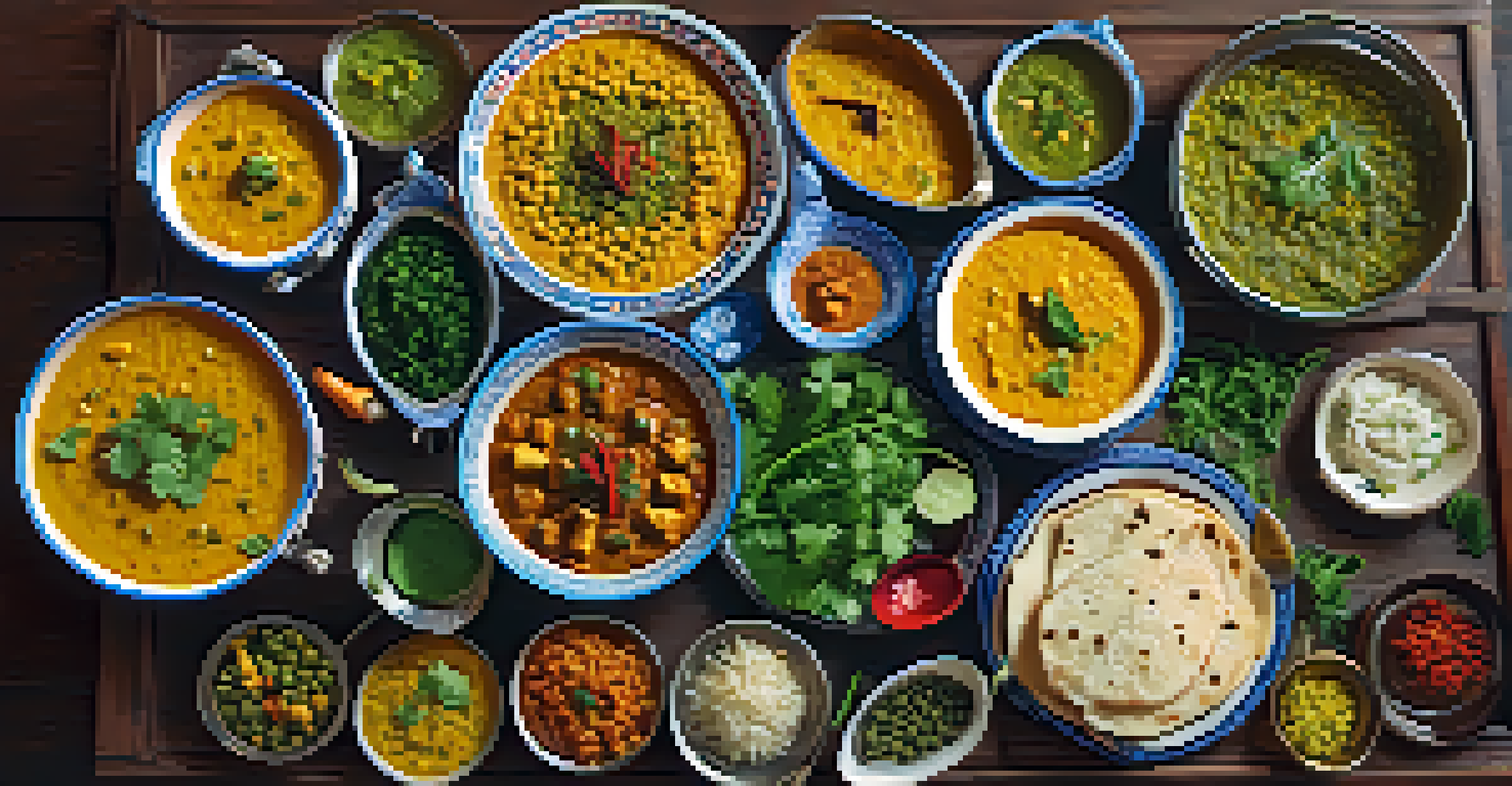The Connection Between Jainism and Strict Vegetarianism

Understanding Jainism's Core Beliefs
Jainism is an ancient Indian religion that emphasizes non-violence, truth, and asceticism. At its core, it teaches that every living being has a soul and deserves respect and compassion. This belief in the sanctity of life is a fundamental principle that shapes the daily practices of Jains.
Non-violence is the greatest religion.
The concept of Ahimsa, or non-violence, is paramount in Jain philosophy. It encourages followers to avoid causing harm to any living creature, whether it's through actions, words, or thoughts. This principle not only influences personal behavior but also extends to the treatment of animals and the environment.
Given these beliefs, Jains strive to live in harmony with all forms of life. This commitment naturally leads many Jains to adopt a strict vegetarian diet, as consuming meat would contradict their core tenets of non-violence and respect for life.
The Principle of Ahimsa in Daily Life
Ahimsa is more than just a teaching; it's a way of life for Jains. It manifests in various daily practices, from the food they eat to how they interact with others. By adhering to this principle, Jains aim to minimize harm and promote peace in their surroundings.

In practical terms, this means that Jains avoid not only meat but also certain vegetables and fruits that may involve harm to living organisms. For instance, root vegetables like potatoes and onions are often excluded from their diets because harvesting them requires uprooting the entire plant, potentially killing it.
Ahimsa: The Heart of Jainism
Jainism's core belief in Ahimsa, or non-violence, shapes the daily lives of its followers by promoting respect and compassion for all living beings.
By practicing Ahimsa, Jains cultivate compassion and empathy, which reinforces their commitment to vegetarianism. This dedication to non-violence extends beyond their diets, influencing their interactions with people and the environment.
Strict Vegetarianism: A Lifestyle Choice
For many Jains, strict vegetarianism is not just a dietary choice but a profound lifestyle commitment. It reflects their spiritual beliefs and the desire to live in alignment with their values. This dedication often shapes their social interactions and community activities.
The greatness of a nation and its moral progress can be judged by the way its animals are treated.
In Jain communities, vegetarianism is a common norm, fostering a sense of belonging among followers. Celebrations, festivals, and communal meals are often centered around vegetarian dishes, reinforcing the collective commitment to a meat-free lifestyle.
This lifestyle choice also influences how Jains approach food sourcing and preparation. Many Jains prefer to grow their own food or buy from trusted sources to ensure that their meals align with their ethical standards.
Cultural Influence on Jain Vegetarianism
Jainism is deeply rooted in Indian culture, and this influence extends to dietary practices. In India, vegetarianism is often associated with purity and moral integrity, making it a respected choice within various communities, not just among Jains.
The sharing of Jain culinary traditions has also contributed to the broader acceptance of vegetarianism in Indian society. Dishes like dal, sabzi, and paneer are staples that highlight the richness of vegetarian cuisine and its cultural significance.
Strict Vegetarianism as a Lifestyle
For Jains, strict vegetarianism is not just a diet but a profound lifestyle commitment that reflects their spiritual beliefs and ethical values.
As the world becomes more aware of ethical eating practices, the Jain approach to vegetarianism offers a rich tapestry of cultural and spiritual insights that resonate with a growing number of people seeking healthier and more compassionate diets.
Environmental Considerations of Jainism
Jains not only prioritize non-violence towards living beings but also emphasize the importance of environmental stewardship. Their belief system encourages sustainable living practices that promote ecological balance and conservation.
By adhering to a strict vegetarian diet, Jains contribute to reducing the environmental impact associated with meat production. Studies show that plant-based diets can significantly lower carbon footprints and resource consumption, aligning with Jain values of minimizing harm.
This environmental consciousness is becoming increasingly relevant in today’s world, where climate change and ecological degradation are pressing issues. The Jain approach to vegetarianism provides valuable lessons in sustainability and responsible living.
The Role of Jain Monks in Promoting Vegetarianism
Jain monks play a pivotal role in guiding the community in matters of spirituality and ethical living, including vegetarianism. Through their teachings and example, they inspire followers to adopt a lifestyle that reflects Jain values.
Monks often emphasize the importance of compassion and non-violence in their sermons, reinforcing the idea that vegetarianism is a vital expression of these principles. Their influence extends beyond personal choices, promoting a collective ethos of respect for all living beings.
Environmental Stewardship in Jainism
Jains emphasize sustainable living practices that align with their belief in non-violence, significantly reducing the environmental impact of food choices.
Additionally, Jain monks engage in outreach and education, sharing knowledge about the benefits of vegetarianism not only within their communities but also with the wider public. This advocacy helps to spread awareness about the ethical, environmental, and health implications of meat consumption.
Conclusion: Jainism's Lasting Impact on Diet Choices
The connection between Jainism and strict vegetarianism is a profound testament to how beliefs shape lifestyle choices. For Jains, vegetarianism is not merely a diet but a reflection of their spiritual convictions and ethical commitments.
As society grapples with issues of sustainability and animal rights, the Jain approach offers valuable insights into living compassionately and responsibly. Their practices encourage a deeper understanding of the interconnectedness of all life and the importance of making mindful dietary choices.

Ultimately, Jainism’s emphasis on non-violence and respect for life continues to inspire individuals worldwide to reconsider their own dietary habits, paving the way for a more compassionate and sustainable future.